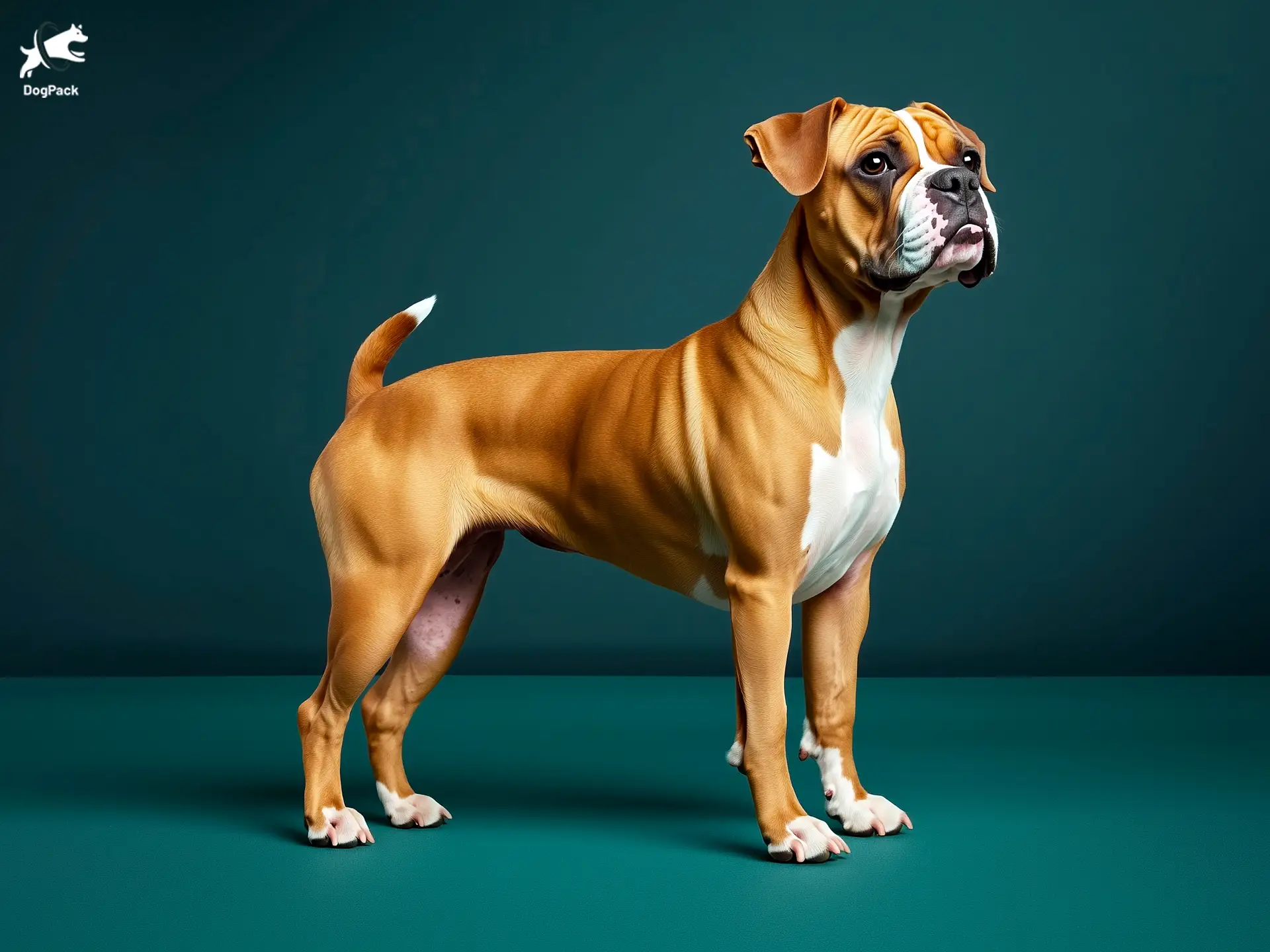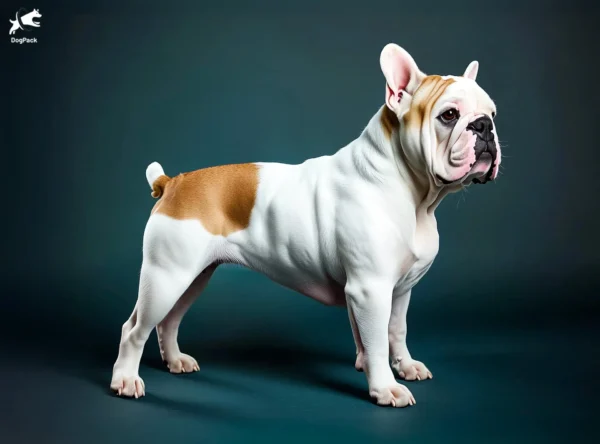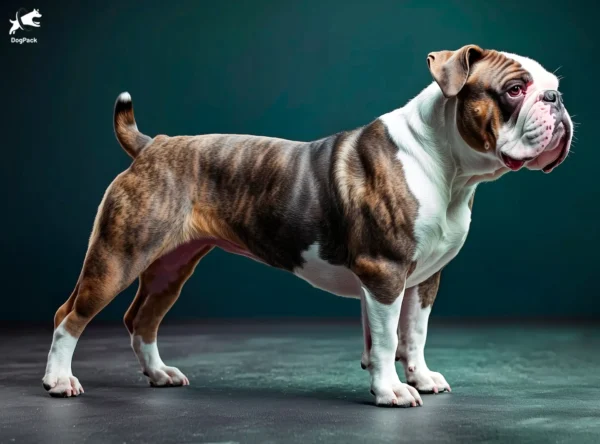Continental Bulldog Breed Info & Overview
The Continental Bulldog, a Swiss breed, is often seen as the healthier, more athletic counterpart to the English Bulldog. Known for its friendly and lively nature, this robust dog combines strength with a lovable personality. With their zest for life and affectionate demeanor, Continental Bulldogs make wonderful family companions, offering the perfect mix of vitality and warmth in a sturdy package.
Characteristics
Pictures
Breed History
The Continental Bulldog originated in Switzerland in the early 2000s, thanks to breeder Imelda Angehrn. She aimed to create a healthier, more agile bulldog, addressing the health issues common in English Bulldogs. By selectively breeding for better respiratory function and physical ability, she developed the Conti as a robust alternative.
In 2005, the Swiss Kennel Club recognized the Continental Bulldog as a distinct breed. The breed maintains the charming personality of the English Bulldog but with improved health and vitality. This new breed quickly gained popularity in Switzerland and began spreading to other parts of Europe.
Though still relatively rare outside Europe, the Continental Bulldog is making its mark as a lovable family pet. Its name reflects both its continental European origins and its bulldog heritage, blending the best of both worlds in terms of health and temperament.
Temperament, Personality
The Continental Bulldog is known for its friendly and affectionate nature. These dogs thrive on human companionship and are often described as being particularly good with children. Their even-tempered demeanor makes them excellent family pets who enjoy participating in all household activities.
While they are generally sociable, early socialization is still important to ensure they are comfortable around other dogs and strangers. The Continental Bulldog tends to be confident without being aggressive, making them pleasant companions in various settings.
Unlike some other medium-sized breeds, Contis are a bit more energetic and playful. They appreciate interactive playtime and mental stimulation, which helps to keep them happy and well-behaved. Their balanced personality suits both active and more relaxed households.
Physical Characteristics
The Continental Bulldog is a medium-sized dog with a muscular build and a well-proportioned body. They typically stand between 16 and 19 inches (41–48 cm) tall and weigh between 50 and 66 pounds (23–30 kg). Their physique reflects strength without sacrificing agility.
They have a short, smooth coat that comes in various colors, including brindle, fawn, and red, often with white markings. The breed’s head is less brachycephalic than the English Bulldog’s, featuring a less pronounced underbite and a muzzle that allows for better breathing.
One of the key physical traits of the Continental Bulldog is its athleticism. Unlike some other bulldog breeds, they are capable of more vigorous activity and have fewer structural health issues. Their expressive eyes and friendly expression make them quite endearing.
Health Issues
The Continental Bulldog was bred specifically to address the health problems common in bulldog breeds. They have fewer respiratory issues due to their less extreme brachycephalic features. However, they can still be prone to certain genetic conditions like hip dysplasia.
Regular veterinary check-ups are essential to monitor for any potential health concerns. Maintaining a healthy weight through proper diet and exercise can also mitigate joint issues. Responsible breeders screen for genetic conditions to promote the breed’s overall health.
According to the American Kennel Club, although generally healthier than their bulldog cousins, it’s important to be aware of potential skin sensitivities and eye conditions. Keeping an eye on their overall well-being and seeking prompt veterinary care when needed will help your Continental Bulldog lead a happy life.
Grooming Needs
The Continental Bulldog’s short coat is relatively low-maintenance. Weekly brushing with a soft-bristle brush or grooming mitt helps to remove loose hair and keep their coat shiny. They do shed moderately, so regular grooming can help manage shedding.
Bathing is only necessary when they get particularly dirty or start to develop a doggy odor. Overbathing can strip their skin of natural oils, so it’s best to keep baths occasional. Pay attention to skin folds and clean them gently to prevent irritation or infection.
Compared to high-maintenance breeds, their grooming needs are manageable and can be a bonding experience for you and your pet. Routine care should also include regular teeth brushing, ear checks, and nail trimming.
Exercise Requirements
While not as high-energy as some breeds, the Continental Bulldog does require daily exercise to stay fit and mentally stimulated. A good hour of activity each day, including walks and playtime, will keep them happy and healthy.
They enjoy activities like fetch, tug-of-war, and even agility exercises. Their improved respiratory function compared to other bulldogs allows them to be more active without overexertion. However, it’s still important to avoid intense exercise during hot weather.
Mental stimulation is also important for this intelligent breed. Puzzle toys, obedience training, and interactive games can help keep their minds sharp. Providing a variety of activities will prevent boredom and promote overall well-being.
Training Tips
The Continental Bulldog is intelligent and generally eager to please, which makes training a rewarding experience. Positive reinforcement methods work best, using treats and praise to encourage good behavior.
Consistency is key when training this breed. Setting clear boundaries and expectations will help your dog understand what is expected. Early socialization and obedience training are recommended to foster good manners and confidence.
Avoid harsh training methods, as they can be counterproductive and damage the trust between you and your dog. Patience and a gentle approach will yield the best results, helping your Continental Bulldog become a well-mannered companion.
Nutrition, Diet
A balanced diet is essential for the Continental Bulldog’s health. They require high-quality dog food that is appropriate for their age, size, and activity level. Typically, they need about 2 to 3 cups of dry kibble per day, divided into two meals.
Because they can be prone to weight gain, it’s important to monitor their calorie intake and avoid overfeeding. Treats should be given in moderation and accounted for in their daily caloric needs. Consult with your veterinarian to tailor a diet plan specific to your dog.
Some Continental Bulldogs may have food sensitivities, so paying attention to how they react to certain ingredients is important. Providing a diet rich in protein with limited fillers can help maintain optimal health and energy levels.
Adoption, Breeders
If you’re interested in adding a Continental Bulldog to your family, consider reaching out to reputable breeders who prioritize health and temperament. Research breeders who perform health screenings and can provide information about the puppy’s lineage.
Adoption is another option, although this breed is still relatively rare in shelters. Checking with breed-specific rescue organizations can be a good starting point. Websites like the Continental Bulldog Club of Switzerland offer resources for potential owners.
Always ensure that you’re dealing with ethical breeders or organizations. Avoid puppy mills and be wary of deals that seem too good to be true. Taking the time to find the right source will lead to a healthier and happier experience for both you and your new pet.
Family Pet?
The Continental Bulldog makes an excellent family pet due to its affectionate and gentle nature. They are known to be great with children, often forming strong bonds and enjoying playtime with the younger members of the family.
The breed’s friendly demeanor extends to other pets as well, especially when socialized from a young age. They can coexist peacefully with other dogs and even cats, making them a versatile addition to multi-pet households.
Their moderate energy levels mean they are happy to join in family activities but are also content to relax at home. Their adaptability makes them suitable for various living situations, provided they receive the love and attention they crave.
Right For You?
Considering a Continental Bulldog? They are a wonderful choice for those seeking a loyal and friendly companion. Their manageable size and temperament make them suitable for both apartments and houses, as long as they get their daily exercise.
If you’re willing to invest time in training and socialization, you’ll be rewarded with a well-behaved and loving pet. Their grooming needs are modest, and they generally have better health than some other bulldog breeds.
Ultimately, the Continental Bulldog is ideal for individuals or families looking for a devoted and affectionate dog. Assess your lifestyle and ensure you can meet their needs to decide if this breed is the perfect match for you.
Conclusion
To sum it up, the Continental Bulldog offers the charm and affection of the classic bulldog but with improved health and vitality. They are friendly, adaptable, and make excellent family pets. If you’re looking for a loyal companion with a loving disposition, the Continental Bulldog might just be the perfect addition to your home.
FAQs
-
Is the Continental Bulldog suitable for apartment living?
Yes, the Continental Bulldog adapts well to apartment living due to its moderate energy levels. As long as they receive daily exercise and mental stimulation, they can thrive in smaller living spaces.
-
How does the Continental Bulldog differ from the English Bulldog?
The Continental Bulldog was bred to be a healthier, more athletic version of the English Bulldog. It has fewer respiratory issues, a more proportionate body, and greater stamina while still maintaining a friendly and affectionate temperament.
-
What is the lifespan of a Continental Bulldog?
The Continental Bulldog typically has a lifespan of 10 to 12 years. Their improved health compared to other bulldog breeds contributes to their longevity, but regular veterinary care is still essential.
-
Are Continental Bulldogs good with other pets?
Yes, Continental Bulldogs generally get along well with other pets, especially when socialized early. Their friendly and tolerant nature allows them to coexist peacefully with other dogs and even cats.
-
What kind of exercise does a Continental Bulldog need?
Continental Bulldogs need about an hour of exercise daily, including walks and playtime. They enjoy interactive games and moderate physical activities that keep them fit without overexertion.
Breed Ratings
The Continental Bulldog is smart and learns quickly, especially when training is consistent and reward-based.
This breed enjoys playtime and interactive games, making them fun companions for both kids and adults.
They have moderate energy levels, requiring daily exercise but also appreciating downtime at home.
Shedding is moderate; regular brushing helps manage loose hair and keeps their coat healthy.
Continental Bulldogs have a low prey drive, making them less likely to chase small animals.
Their short coat is easy to maintain with weekly brushing and occasional baths.
They respond well to positive training techniques and are eager to please their owners.
This breed prefers company and may experience separation anxiety if left alone for long periods.
Generally quiet, they don’t bark excessively but may alert you to visitors.
Drooling is minimal compared to other bulldog breeds, but some slobber can occur.
They are typically friendly with other dogs, especially when properly socialized.
Bred for improved health, they have fewer issues than other bulldog breeds but still need regular vet care.














